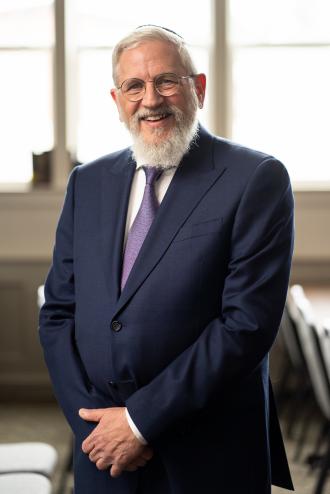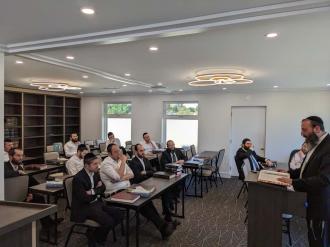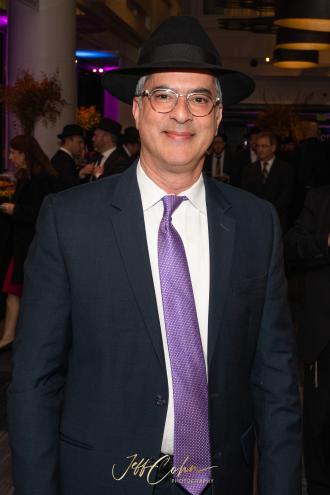Jerusalem, Israel - Mar. 6, 2022 - 3 Adar II 5782 - President Isaac Herzog spoke today at the swearing-in ceremony for judges at the President’s Residence. At the ceremony, 50 judges swore their oaths of allegiance in front of the President: one Supreme Court justice, 19 district court judges, and 30 magistrates’ court judges. Justice Minister Gideon Sa’ar and Supreme Court President Esther Hayut also spoke. Members of the Judicial Selections Committee, the incoming judges, and their families also participated.
President Isaac Herzog’s full speech:
This is indeed a day of celebration for the justice system, for the Israeli value of mamlakhtiyut, and for the whole Israeli people. The swearing-in of fifty judges is a truly special event. The ripples of its influence on all of our lives will be felt, starting tomorrow, for many years to come.
I want to congratulate you—my friend Justice Minister and Deputy Prime Minister Gideon Sa’ar, Supreme Court President Esther Hayut, and members of the Judicial Selections Committee—for the achievement of completing this task, and the devoted and principled work that has led us to this ceremony.
Ladies and gentlemen, around one month ago, former Supreme Court President Miriam Naor, of blessed memory, whom I called a titan of Israeli law, left us quite suddenly.
Soon after her passing, we parted with sorrow from former Supreme Court Justice and former State Prosecutor Gabriel Bach, of blessed memory. Justices Naor and Bach left a tangible imprint on the Israeli justice system.
They set for you, and for the whole of Israeli society, a high bar of diligence, rigor, personal example, and humanity, together with intellectual capacities of the highest order.
The family of Supreme Court justices is joined today by Justice Gila Kanfi-Steinitz. If I may, I want to wish you and my friend Yuval congratulations and blessing for your success. I am confident that your professional integrity, your experience, and your rich world of ethics will help you fulfil your lofty office with success.
In Justice Naor’s speech in memory of Supreme Court President Justice Moshe Landau, with whom she clerked, she described meeting him immediately after her appointment as a judge, and this is what she said:
“After I was sworn in as a magistrate, I went to him to receive his blessing and sage counsel. I asked for his advice, but he chose to equip me with only one piece of advice. That one piece of advice has remained etched in my heart as a compass and guide.
“Judges handle many cases every day, he said, but they must remember that for the person being judged, this ‘case’ is his one and only trial. No judge, on account of the large caseload, may treat lightly any of the affairs of those being judged before him. He must see every ‘case’ and every affair as a world unto itself, just as the person being judged sees it.” Thus spoke Justice Naor.
And indeed, the value of listening to and empathy for those being judged, which was so characteristic of Justice Naor and Justice Bach, and of course Justice Landau, is deeply rooted in the tradition of Hebrew law. A tradition that emphasizes the first duty imposed on judges: “Decide justly between one party and the other—be it a fellow Israelite or a stranger. You shall not be partial in judgment: hear out low and high alike” (Deuteronomy 1:16-17). Hear them out, and listen. Listen to their words. Listen to the words that are spoken between the lines. Hear out low and high alike.
Equality before the law demands of you—the judges being appointed today—first of all to hear and to listen. The rulings that you issue will determine people’s fate and influence human lives. Your difficult caseload and the great pressures involved in your work must not be allowed to impair your duty to listen, the duty that you take upon yourselves today.
Be attentive. Be humane. Be humble. Thus will you deliver true justice!
Listening and sensitivity, seeing the other in distress and coming to his aid—these stand at the core of our values as a people and as a nation.
In this context, and at this hour of a global storm, I wish to pay my respects to the anonymous soldiers working night and day providing humanitarian aid at the front of the war in Ukraine. To those from the Foreign Ministry, from the National Institutions, from civil society and aid organizations, religious leaders, community leaders, and women and men who without any organizational affiliation who are working under immense dangers and difficulties to save lives. They are the beautiful face of Israel. They are the beautiful face of our nation, which acts in the spirit of the Sages, who said, “whosoever saves a single life, it is as if he saved an entire world.”
Therefore I also think that every effort on the part of the Prime Minister and the Government of Israel to promote steps to save lives and prevent bloodshed is most welcome and proper.
I also want to pay tribute to the important work of Israeli journalists reporting from warzones and allowing us and the whole world to know what is happening, to familiarize ourselves, and to commit ourselves to the resolution of the humanitarian crisis.
Coming back to the legal world, I want to add another aspect that also touches on the whole Israeli justice system. We must not treat moral failings, and yes—we should not be ashamed to use these words, moral failings—as a norm, or God forbid to lend them any legitimacy.
For every such case pulls the rug from under the most central moral foundations that are essential for a pure, clean, and independent justice system, one free of any extraneous considerations.
And now to you, dear judges being appointed today. On a personal level, for each and every one of you, this moving occasion marks a great personal achievement. An achievement grounded in hard work, excellence, and proven judicial excellence. But this occasion is not entirely a personal one. This is an opportunity to give thanks and to express appreciation to your immediate families, who are also excited—even a little bit more than you are. They have been by your side until now, and how they will have to deal with the judicial burden. The mission on your shoulders is heavy and comes with great responsibility, but nobody can face it quite like you.
I wish you and all of us: may you fulfil your missions and the words of the Prophet Zechariah: “Speak the truth to one another, render true and perfect justice in your gates.” Thank you all, and every success!






















